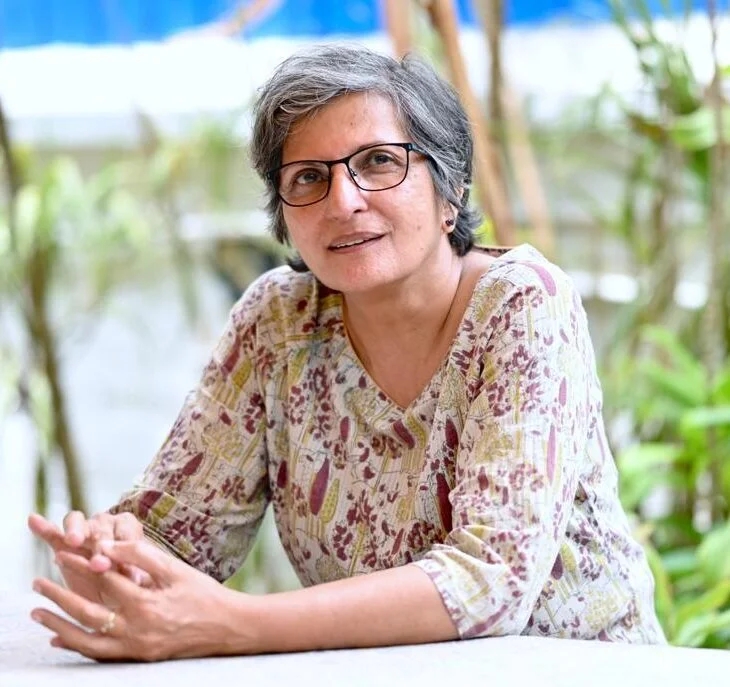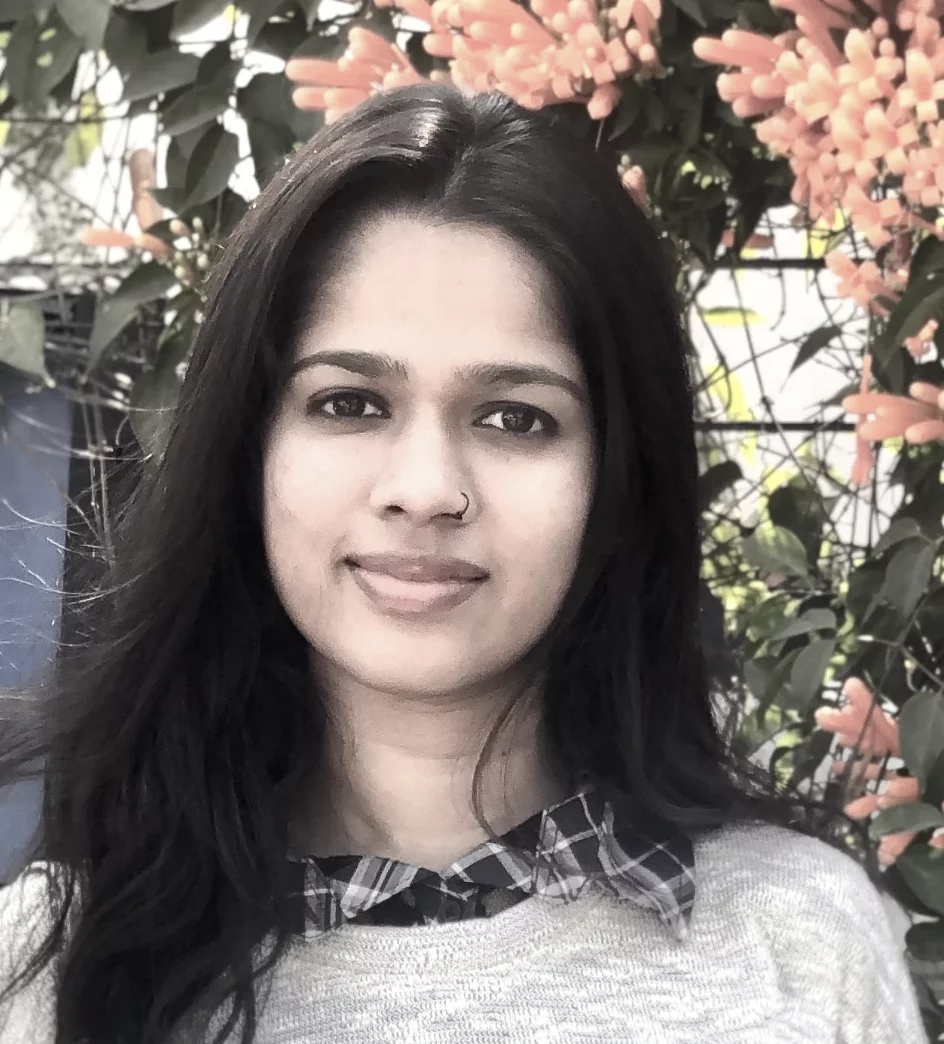WORDS BYHeta Pandit
ILLUSTRATIONS BYRupali Goel
Listen to this story. Narrated by Heta Pandit. Soundscape by Aaron Monteiro with oviyo sung by Saraswati Aai.
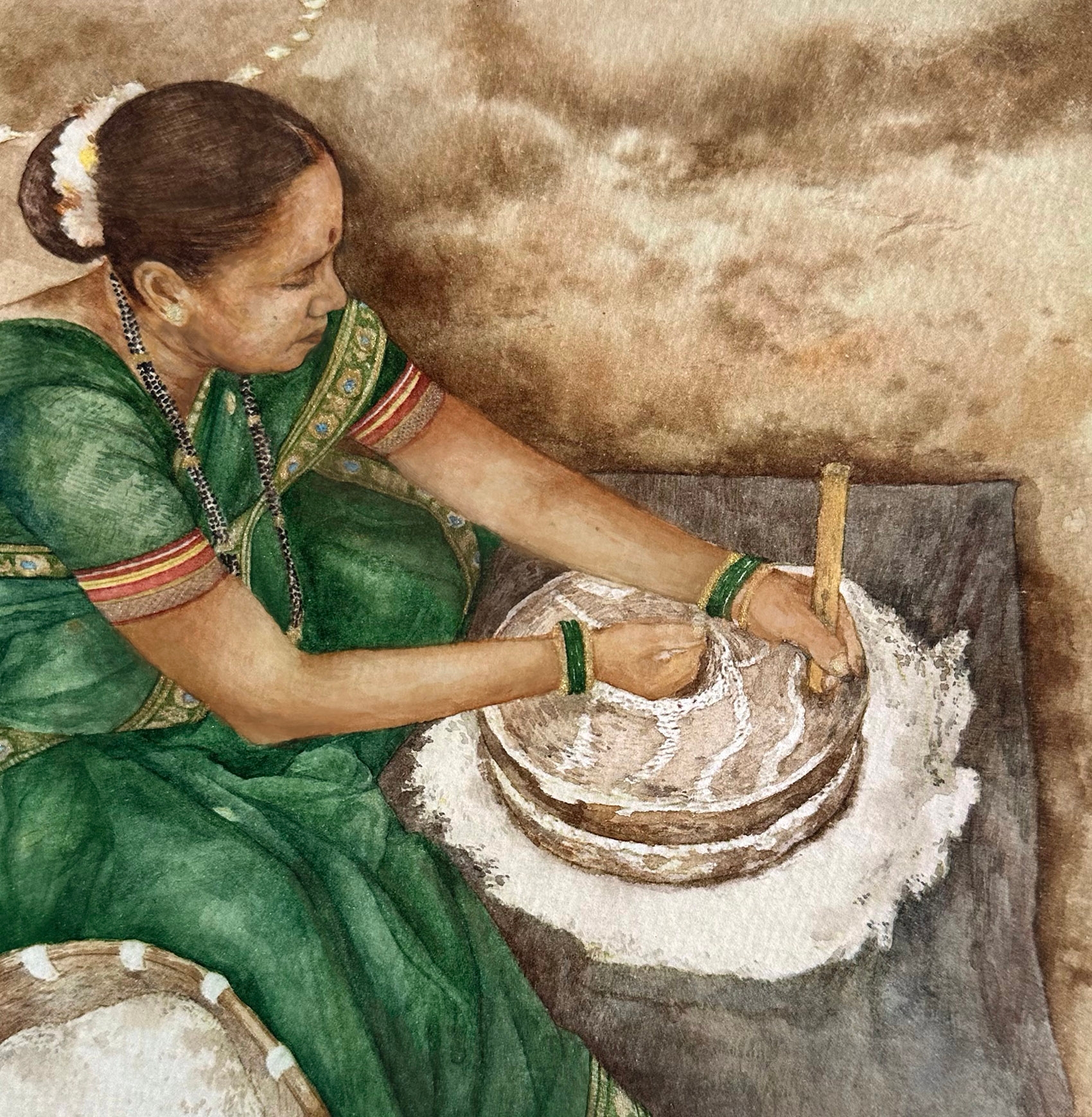
Sarojini says you always pour rice grains into the well with the right hand. Illustration drawn from the original photograph by Nina Sabnani.
I am often asked how I got into documenting Goa’s oviyos (songs sung at the grinding stone) when clearly, architecture was my forte. It began with architecture and a trip to the Shri Mauli temple at Zolambe village on the border of Goa and Maharashtra. Ethologist Rajendra Kerkar and researcher Pournima Kerkar were keen that I come and have a look at the kaavi art murals on the walls of the temple. Kaavi is the ancient art of etching in red soil that can now be seen in Maharashtra and Karnataka (and faraway erstwhile Maratha kingdoms like Gwalior and Orcha in Madhya Pradesh) but has its origins in Goa. Kaavi may be described as figurative art, decorative art, aquatic art, and architectural art since it is always rendered directly on the walls of a temple, church, or home. The kaavi art that we saw that morning was fascinating. Every border on the pillars in the temple was unique. There were entire panels of narratives from Lord Krishna’s life and several dedications to King Cobras. On one such wall, I saw a narrative that took my breath away. It was the narrative of Garuda rescuing a King Cobra.
This went against everything I had known. Were the eagle and the cobra not enemies? Why would an eagle save the life of a cobra? That is when Rajendra Bhai related the story of Bhujang, in which Garuda rescues the King when She sees Him drowning in the rain. “In Goa, we rescue our enemies if our enemies are in trouble.” That sentence coming from Bhai changed my life. I asked him if these stories had been documented, and he then went on to explain that this was part of Goa’s oral history and that they were retold in the form of oviyos, songs sung at the grinding stone. I made it my mission to document them. With electricity coming to the most remote Goan village, with child-marriages becoming a thing of the past, the grinding stone was no longer the most important object in the household, no longer serving its purpose as a “woman’s best friend.”
Childhood memories are strange creatures. They are, in fact, children of the mind. They cannot be picked up (from under rocks) and dropped off (at Obedience School), for they will run around, play hide-and-seek, hop-scotch over flat courtyards and skip over ropes that are, to your adult mind, invisible. Childhood memories are like loosely woven fabric that you can bunch up, use as a comforter that no one else can see, and come floating down from the skies like a cloud that is ready for bed. The interesting thing about childhood memories is that you can also borrow someone else’s memory and mesh this piece of fabric with your own. It is borderless, boundless, fearless.
When I first met Saraswati Aai (aai, or mother, is a term of endearment in Goan Konkani) in the tiny village of Poriem in North-East Goa, I needed Shubhada Chari (a keen researcher and school teacher) to help me understand Aai. The dialect Aai spoke was unfamiliar and so was her story. For one, I had never met anyone before who had no idea of how old she was (“I have seen three bamboo flowering seasons”) and had never met anyone who had been married off at the tender age of 8 (“when you went into the forest with the goats and every single goat came back, you were ready”). In the absence of a mother-in-law, Aai, at 8, became the head of a household. She would go to the fields, take care of the house, cook for everyone on her return, look after the needs of her 5-year-old sister-in-law (“I had to see that she learnt everything before she got married”), and tend to the animals in the stable and the chicken coup.
Where was I when I was eight years old? I was at school in the Convent of Jesus and Mary, Baroda in Gujarat, my teacher Roshan’s pet. I remember Teacher Roshan as being young, pretty, and almost always in a floral dress. When Teacher Roshan rode off on her bicycle after school, she was like a garden on the move. I could almost smell the flowers on her dress. Here, so many decades later, I am meeting Aai, who has never learnt to read or write, who grows flowering shrubs in her garden so she “has matching flowers for her hair”. Aai has a new sari on for our first meeting (and for every meeting thereafter) and a hibiscus, champa, or marigold to match.
Where was I when I was eight years old? I was at school in the Convent of Jesus and Mary, Baroda in Gujarat, my teacher Roshan’s pet. I remember Teacher Roshan as being young, pretty, and almost always in a floral dress. When Teacher Roshan rode off on her bicycle after school, she was like a garden on the move. I could almost smell the flowers on her dress. Here, so many decades later, I am meeting Aai, who has never learnt to read or write, who grows flowering shrubs in her garden so she “has matching flowers for her hair”. Aai has a new sari on for our first meeting (and for every meeting thereafter) and a hibiscus, champa, or marigold to match.
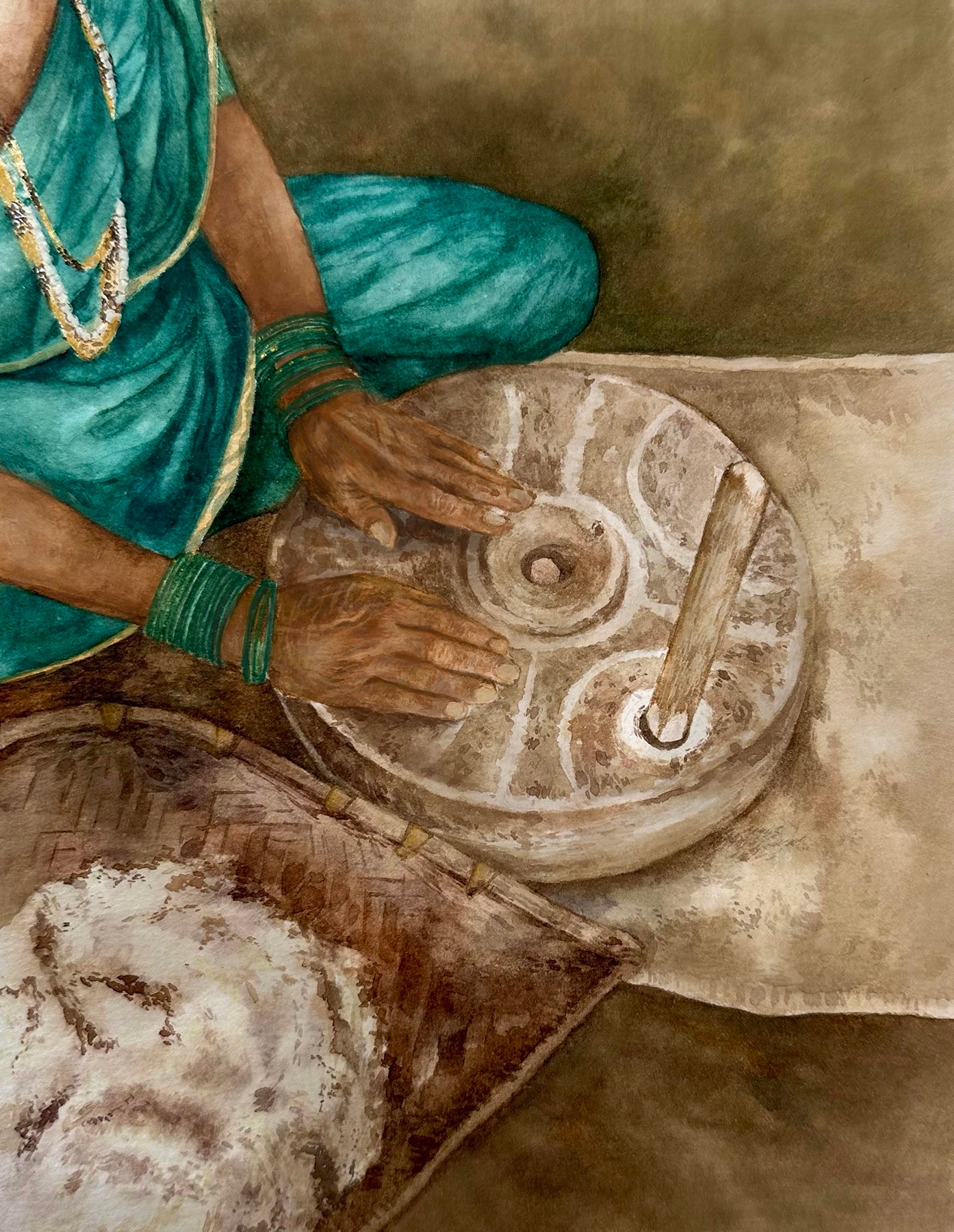
If I had to use just one word for those memorable meetings, it would be “generous.” Aai showed me how to wear a sari the way “we wear it.” She shared the oviyos generously, and when I whipped out my notebook to make notes, she asked me with a twinkle in her eye, “Hey, don’t you have a mobile phone? Why are you taking notes the old-fashioned way?” Right through our interviews, video recordings and compositions, that twinkle in her eyes stayed. Aai keeps the songs of sadness, hardship, and personal suffering to herself. The happy songs she takes to weddings. Her twinkle became brighter and more mischievous when she said, “I cannot attend weddings as a widow, but they have to invite me to a wedding as a performer!” What Saraswati Datta Sawant lost in childhood memory, she has won in the memory of the wedding songs sung to the percussion of an everyday object like the grinding stone in her kitchen.
Subhadra Arjun Gaus, also a child-bride, married into the village of Ghoteli No. 2, Sankhli, recalls how she could see her mother’s house across the river. “Not today,” her mother-in-law would say. “See how the river is flooded.” Or, “There is no one to escort you, and we cannot allow you to go with the boatman alone.” Married at 8, Subhadra was 16 when she was sent to her maternal home for a visit. “I met my brother for the first time when I went home for my first child’s birth. He was eight.”
Subhadra sees her story as anything but tragic. She was allowed to sing; she could compose her songs; she was allowed to travel when the “government people came and took us on tours to different places,” and more important than all of that, she was taken as a helper by her husband when he went to the village houses to repair roofs. “That is how I learnt how to repair country-tiled roofs. I am probably the only woman in Goa who has this skill.” What advice did she have for someone like me, living under the illusion of an empowered single woman? “You have to die if you want to see Heaven.”
Sarojini Bhiva Gaonkar has been singing oviyos ever since she can remember. At first, it was with both her grandmothers, and then she accompanied other performers at folk festivals, weddings, school events, and naming ceremonies. Sarojini is a headmistress at a school, an independent researcher, and is fluent in Hindi, Marathi, English, and Konkani. “When they started looking for a groom for me, I was already teaching in a school and earning a decent salary. I told my parents that I would pay for my own wedding and even asked for a private meeting with the prospective groom at the interview. I lay my conditions down…that I should be allowed to pursue my career and my singing and that everyone in the new family should have complete trust in me. My husband is from an Army family and it is my husband and my parents-in-law that have been my rock.”
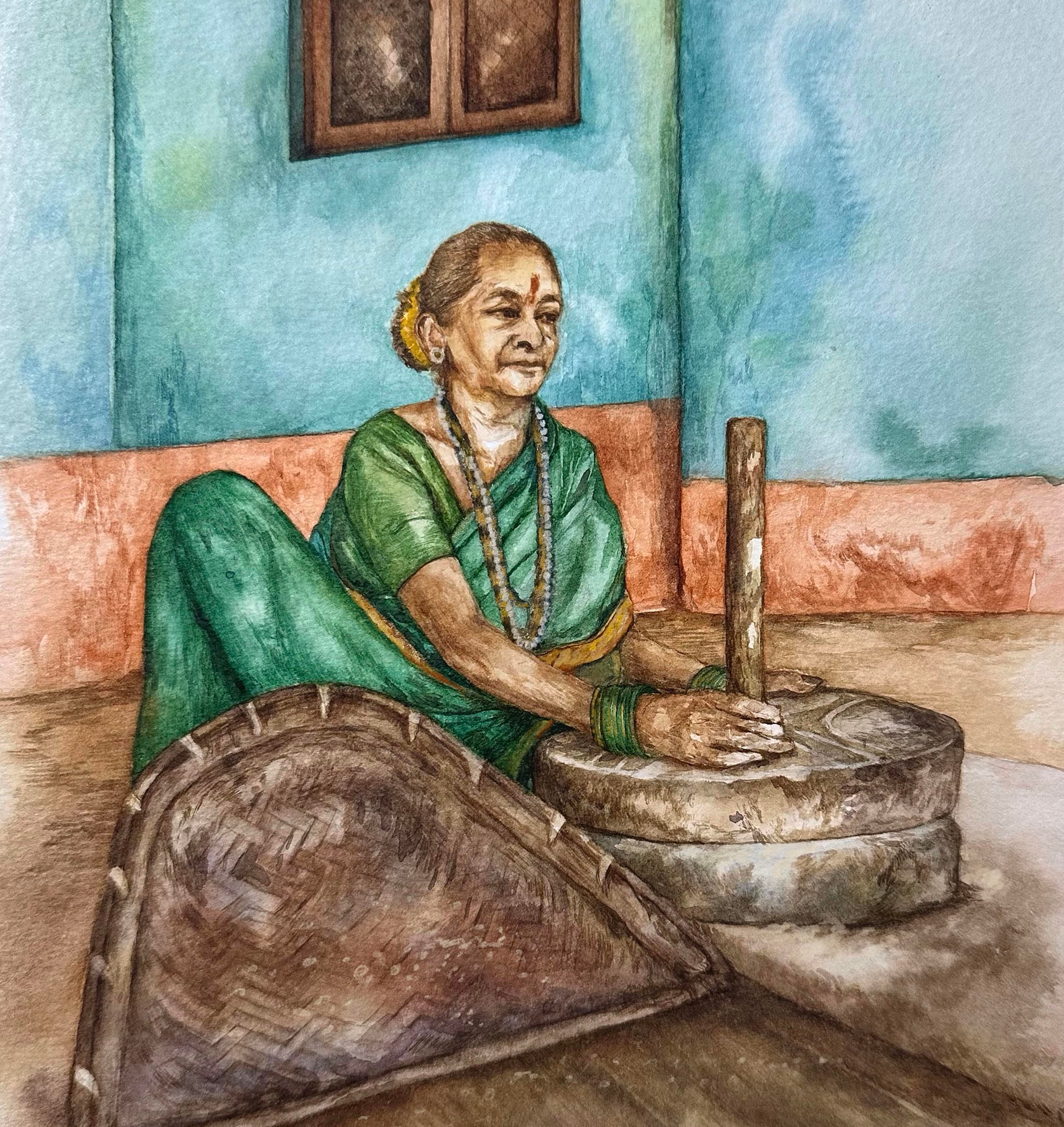
Laxmi demonstrates the sitting posture at the grinding stone for a menstruating woman. Illustration drawn from the original photograph by Harihara SS.
Laxmi, on the other hand, met her husband for the first time at their wedding. She was 18. “They covered my eyes with a sari at the wedding so I did not see him right through the ceremony.” Yet, when I see Laxmi and her husband Vishnu together (as he weaves brooms from dry palm fronds and she weaves the flowers into a garland for the sacred basil in their front yard), I see love and communication like I have not seen anywhere else before or since. “All I remember of my wedding was that the ragi bhakris (millet rotis) were so strong that when they ran out of banana leaves, we just served the vegetables in the bhakris. It was the millet we had grown ourselves, in our own fields.” Even today, Laxmi and Vishnu and their three sons are proud farmers. When they serve us a meal, almost everything on our stainless-steel thalis has been grown in their fields. “I am still the best singer and the dancer in the village”, she says, as she turns herself into a human tumble-weed and rolls around like a green marble in her pretty green nine-yard sari.
She tries to teach me how to sing and dance and then gives me up as a hopeless student. In turn, I tease her by asking her the eternal question. “What will happen to all these songs when you are gone?” She places a wad of betelnut in one side of her mouth and says, “That is why there are books, no?”.
And that is when I know that my stash of childhood memories, my teacher Roshan and her floral dresses swaying in the afternoon Baroda breeze, my becoming a writer of Goan stories, had all been placed in my life for a purpose.
From the Field...



From left to right: Subhadra Aai with her grandson; Laxmi and Heta share stories; Saraswati Aai asking Heta to neaten the pleats on her saree.
Photography by Harika SS
Photography by Harika SS
